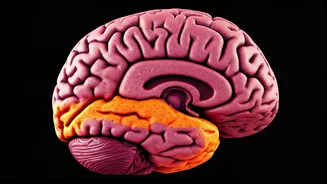Food and Brains
The examination of the correlation between dietary intake and brain structure is becoming increasingly significant. Emerging studies are showing that what
people consume could affect the physical composition of their brains. Ultra-processed foods, characterized by high levels of sugar, salt, and unhealthy fats, are a subject of increasing scrutiny. These foods, often engineered to be highly palatable, tend to be rapidly consumed. This raises concerns about their long-term impact on overall health. The growing body of research explores how these types of foods might interact with various systems within the body, including the complex machinery of the brain. The primary goal is to provide a better understanding of how dietary habits could influence the brain's form and function, thereby possibly influencing mood, cognitive performance, and the likelihood of developing neurological disorders.
Brain Structure Impact
Research has started to link the consumption of ultra-processed foods with noteworthy alterations in brain structure. Studies, employing advanced neuroimaging techniques, are showing distinct differences in the brains of individuals who frequently eat such foods when compared to those with healthier eating patterns. Specific brain regions, which play vital roles in cognition and emotional regulation, are particularly affected. For example, some investigations indicate reductions in grey matter volume in areas critical to decision-making and impulse control. Simultaneously, changes are observed in regions associated with reward processing, implying that ultra-processed foods might impact the brain's pleasure pathways, potentially contributing to food cravings and addictive behavior. These findings give a compelling viewpoint on the effect that dietary practices have on brain health and offer an important area for additional research, aiming to understand the underlying mechanisms and possible interventions.
Cognitive and Emotional Effects
The implications of these structural brain changes stretch beyond mere anatomical differences; they likely affect cognitive function and emotional well-being. Individuals with diets rich in ultra-processed foods may experience challenges in areas like memory, attention, and executive functions. Furthermore, these dietary choices are potentially linked to a higher risk of mood disorders, including anxiety and depression. The reward pathways in the brain, often triggered by the consumption of these foods, could foster emotional imbalances, leading to cycles of overeating and negative emotional states. Evidence reveals that the chronic consumption of ultra-processed foods could create a state of chronic inflammation in the brain, which in turn could damage brain cells and disturb the functions of neurotransmitters, further adding to mood swings and cognitive issues. The evidence highlights the significance of adopting mindful dietary habits to support overall brain health and emotional stability.
Shifting Dietary Habits
Given the adverse effects associated with ultra-processed foods, changing dietary habits is an important focus of public health initiatives. Encouraging individuals to adopt more wholesome eating patterns is central. This involves increasing the intake of fresh, unprocessed foods such as fruits, vegetables, lean proteins, and whole grains. Decreasing the consumption of convenience foods, sugary beverages, and packaged snacks is also key. Strategies for promoting healthy eating include providing educational programs that inform people about the ingredients and nutritional value of different foods, promoting cooking skills to empower individuals to prepare their own meals, and advocating for policies that support the production and availability of nutritious foods. A dietary shift from ultra-processed to whole foods could improve not only physical health but also enhance cognitive function and emotional regulation, contributing to enhanced overall well-being. This dietary transformation is a crucial step towards safeguarding brain health and mitigating the risks associated with modern diets.
Future Research Pathways
Although existing research reveals a clear connection between ultra-processed foods and brain structure, ongoing investigations are crucial to fully grasp the complexities of this relationship. Future studies should aim to discover the precise biological mechanisms by which ultra-processed foods affect the brain. This could involve exploring the role of gut health, inflammation, and specific nutrients in influencing brain function. Also, future research is set to investigate the long-term impact of dietary changes on brain health, evaluating whether improvements in diet could reverse any structural damage or enhance cognitive performance. Clinical trials could evaluate the effect of dietary interventions on mental health outcomes and cognitive function in various populations. This continuous research effort is necessary to refine dietary recommendations and develop more effective strategies to protect brain health in today's society, allowing people to make educated decisions about their food consumption and its effects on their brains.












![[WATCH] 'Real Madrid, Ramadan and rest' - Mohammed Siraj how last-minute World Cup call-up changed February plan](https://g-mob.glance-cdn.com/public/fc/image/ByYT_LEmlrD0.webp)



